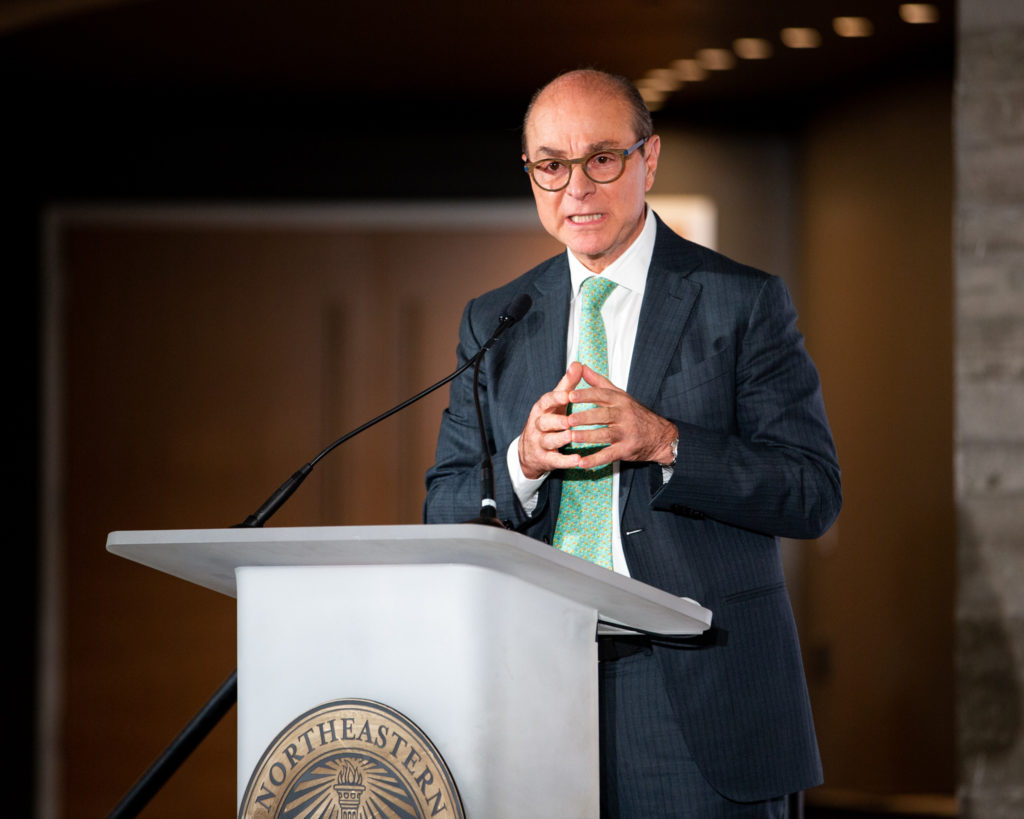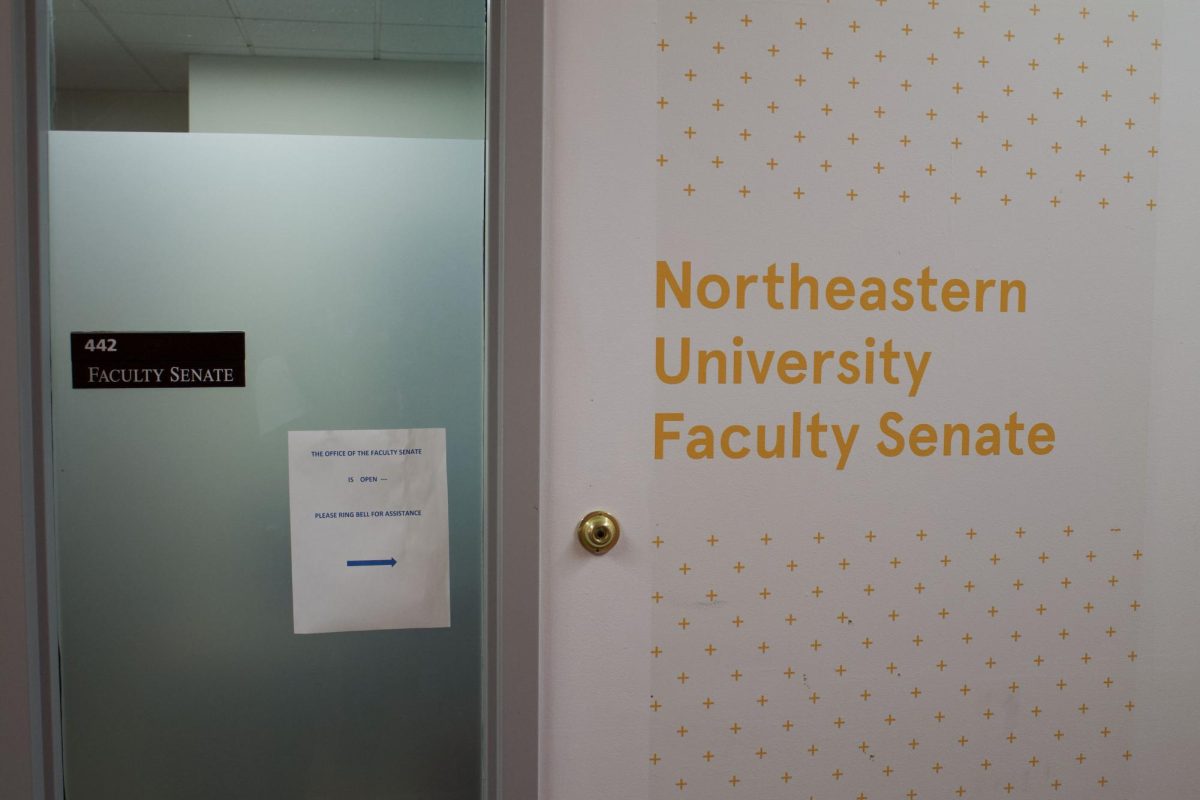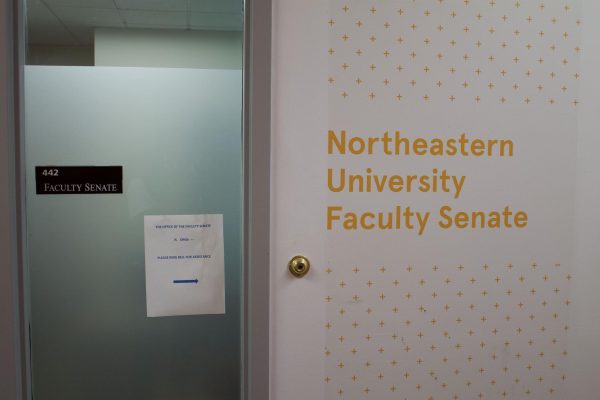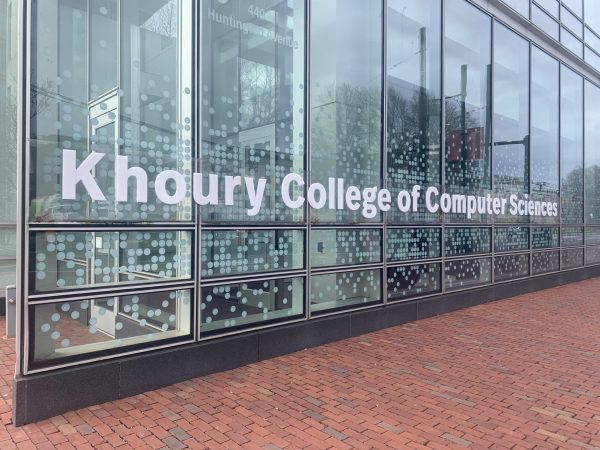Aoun teases second ISEC building at Faculty Senate meeting
Northeastern President Joseph E. Aoun pledged to give part of his salary to COVID-19 research efforts.
November 1, 2018
Northeastern President Joseph E. Aoun gave his annual address to the Faculty Senate in an Oct. 24 meeting, highlighting the university’s successes and previewing plans for micro-degree programs and an additional ISEC facility.
Aoun said the current climate for higher education in the United States was hostile, but told professors and key administrators in the faculty’s governing body that Northeastern’s strategic plan prepares the university for the future.
The president cited cuts in federal funding, divided public opinion and adverse immigration policy in particular as current challenges to U.S. universities.
“No matter how you look at it, the situation is not very rosy,” he said. “We are sending, as a nation, vibes that are pushing [international] students away to the competition.”
Aoun pivoted away from these challenges, however, and said Northeastern was well-positioned for the changing landscape. Restating the signature thesis from his book “Robot-Proof,” he outlined the role the university’s experiential learning can play in making students irreplaceable in a machine-dominated workforce.
“The jobs are disappearing are at all levels — blue-collar and white-collar jobs. Frankly, A.I. is collar-blind,” Aoun said. “The implication is that … everybody is going to need lifelong learning. We have been early movers in lifelong learning … and we are well-positioned because everything we do is experiential.”
The president underscored Northeastern’s track record of practical education beyond the undergraduate level, citing the university’s large portfolio of professional certificates and master’s [degrees] and hinting at the possibility of short-term “micro-certificate” programs in specific topics such as cybersecurity.
Aoun also highlighted key areas of growth for the university, including combined major enrollment, research funding and student satisfaction.
“Combined majors … are the fastest growing segment here. It’s the integration of disciplines. Our students want humanics,” he said, alluding to the term used in his book to describe literacy in “data, tech and humans.”
With funded research at an all-time high of $160 million, Northeastern will require infrastructure upgrades and new facilities to keep up with increased research productivity, the president said.
“We have ISEC one, and we are starting to think about an ISEC two,” Aoun said, referring to the Interdisciplinary Science and Engineering Complex opened in 2017. “By 2022, research space on campus will be completely occupied.”
Aoun hailed student satisfaction as another high point for the university.
“People love it here because of the engagement … and the culture we have of being accessible,” the president said. “That’s not true of many places.”
The president did not cite a specific survey or statistics regarding student satisfaction.
Ultimately, Aoun proclaimed Northeastern to be part of a “golden age of higher education,” but sent mixed messages about how Northeastern views competing institutions.
Responding to a question regarding MIT’s plans for a billion-dollar artificial intelligence college, Aoun told the Senate to “never worry about the competition.”
Later, the president’s tone shifted when discussing the university’s positioning relative to other schools.
“We always monitor our peers,” he said. “We study our peers constantly.”
After Aoun’s address, the focus of the meeting moved to more routine business in a manner Provost James C. Bean described as going “from 30,000 feet to about 17.”
Jane Moyer, Northeastern’s vice president of human resources management, outlined a new parental leave policy for faculty and staff, which will give birth parents, partners and legal guardians eight total weeks of fully paid leave as well as four additional weeks at half-pay.
Moyer said the new policy “reflects the university’s commitment to the needs of families and to ensuring that talent comes here and thrives here.”
The Senate also voted in favor of a change to the writing-intensive NUpath component, which eliminated a requirement that students in discipline-specific courses produce works for a variety of audiences.
Instead, Vice Provost for Curriculum Advancement Chris Gallagher proposed a new requirement that students “draft their writing, revise the piece in process, edit and get feedback from readers,” which subsequently passed.
“We’re voting on requiring that writing courses include writing,” Bean said. “I’m supportive of that.”


















